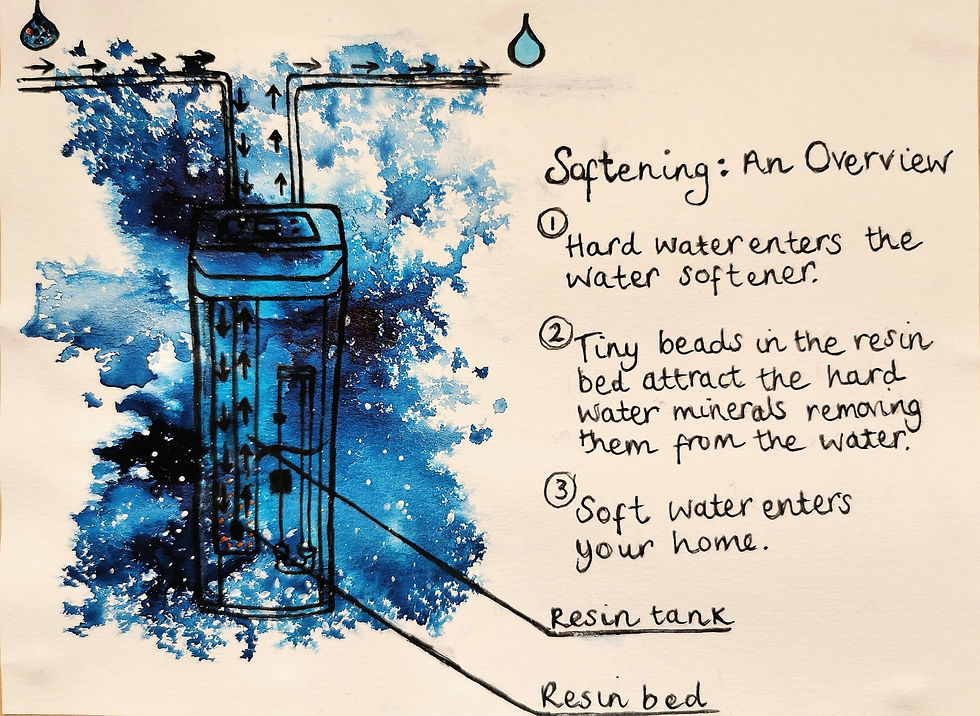Is your water soft?
- Brie Purse

- Feb 14, 2021
- 4 min read
Nothing is more softer or more flexible than water, yet nothing can resist it - Lao Tzu
One of the first questions we get asked is 'What is a water softener?' and you would be forgiven for not knowing. Considering we live in one of the hardest areas in the UK there is surprisingly little awareness. In fact it wasn't until my husband started working for Dorset Water Centre back in 2011 that I became aware myself. Having had a softener now for 9 years I am a complete convert and would never go back.
But what exactly is a softener, how does it work and why should you get one?
A water softener is designed to remove the minerals that create water hardness. If you live in a hard water area you are very likely to know about it. Visibly you will be able to see hard water as it builds up and leaves a soapy film scum across bathrooms and kitchens. You know - that grotty grey build up that you get around taps that takes strong cleaning chemicals and some elbow grease to attempt to remove, to only build up again - that is limescale. Along with what you can visibly see will also be what you can’t see. Where it starts to build up in your appliances and heating system, creating problems and causing you to prematurely replace ruined boilers, hot water cylinders, washing machines etc.
Over 60% of the UK is classed as having hard or very hard water. Thats around 13 million households with hard water. Here in Dorset we have some of the hardest water in the UK being rated at Hard-Very Hard, depending on where you are. Water that we use for cooking, cleaning, and bathing - all hard. So it is easy to see why a water softener could serve a vital role within your home.
What exactly is a water softener?
Ok here is the science part…

A water softener is a whole house filtration system that removes the ‘hardness’ from the water. The 'hardness' being the chemicals such as calcium and magnesium. It does this through a process called ion exchange. Which is basically a way of saying swapsies or switcheroo.
When hard water enters your home it will travel into the resin tank. Once there it flows through a bed of spherical resin beads (if you're an 80’s kid these beads look like the magic dust that powers santa's sleigh in the santa clause movie. Magical). These water softening ion exchange resins are used to replace the magnesium and calcium ions found in hard water. These unwanted ions are held by the beads while other ions such as sodium are released. Hence the exchange of ions = ion exchange system.
There are several different types of ion exchange resins designed to selectively prefer one or several types of ions. These resins are then regenerated by rinsing it through with salt. The salt part is the bit you will become familiar with, refilling the softener with block or tablet salt as and when it needs it (it will depend on size of house, number of bathrooms, how many people live in the home and how efficient the softener is).
Ok, so why do I need a softener?
I am speaking as someone who has had a water softener for 9 years. I have experienced all the benefits and also the typical slip in the shower the first time you use it after the softener is installed - those soapy bubbles are slippy when you've used too much soap! That aside, just like all our satisfied customers I would never be without it. The benefits are ten fold. A water softener really does make life easier (cleaning is a doddle) and will save you money in the long term. Some of the benefits of having soft water deserve their own blog post but for now I will just touch on a few of the bigger benefits to having a softener.
Water Heating - remember I said about the invisible effects? Limescale can build up inside your heating system without you even knowing. 1.6mm of scale build up within your water heating system can cause a 12% loss in heating efficiency. Needless to say over time the heat exchange system or cylinder will eventually need repairing or replacing costing £££.
Home Appliances - these will last much much longer. If you live in a hard water area you are probably familiar with the limescale build up that is clearly visible in your kettle. This is the limescale you can see. Imagine that in your washing machine . A water softener will eliminate this.
Household items and toiletries - You can reduce things such as soap, shampoo, conditioner, laundry detergents and cleaning products by about 75% - that could equate to a £400 saving across a year.
Hair and skin will feel more soft and silky - that pesky limescale that deposits around your taps will also build up on your hair and skin.
Overall investing in a water softener will save you time, energy, and money, and will protect you and your home.




Comments